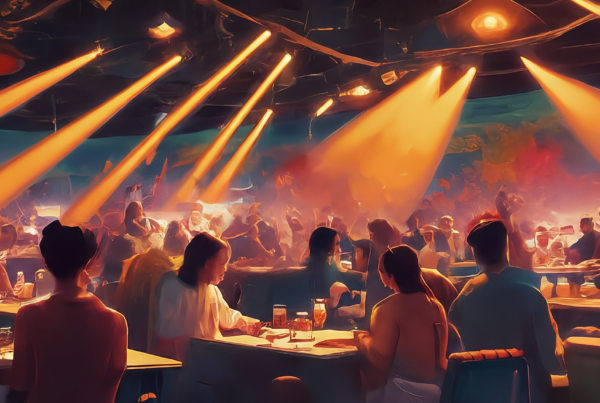In today’s fast-paced business world, creating a memorable customer experience is more critical than ever. For multi-location businesses in the hospitality and entertainment sectors, this means delivering consistent and engaging entertainment solutions across all venues. Whether you manage a chain of bustling restaurants, vibrant bars, or sprawling casinos, finding the right entertainment solutions can be a game-changer for your brand.
Imagine walking into one of your locations and being greeted by a seamless blend of music, visuals, and atmosphere that captivates your patrons. This isn’t just a dream; it’s the power of Multi-Location Business Entertainment Solutions. By standardizing entertainment experiences across various sites, businesses can enhance customer satisfaction, boost brand loyalty, and ultimately drive revenue growth.
At DLM Media, we understand the unique challenges faced by businesses operating multiple locations. Our expertise in commercial video programming ensures that each customer enjoys a high-quality entertainment experience, no matter where they are. As industry leaders, we offer tailored solutions that cater to your specific needs, helping you create an engaging and inviting atmosphere that sets you apart from the competition.
In this blog post, we will explore the key strategies for optimizing entertainment solutions across multiple business locations. From understanding your audience to selecting the right technology, we’ll cover everything you need to know to elevate your brand’s entertainment offerings. So, join us as we dive into the world of Multi-Location Business Entertainment Solutions and uncover the secrets to creating unforgettable customer experiences.
Understanding Multi-Location Entertainment Challenges
Operating a multi-location business in the entertainment sector comes with its own set of unique challenges. These businesses must ensure that each venue offers a consistent and engaging experience, regardless of location. However, achieving this uniformity is easier said than done. From logistical hurdles to varying customer preferences, businesses need to navigate a complex landscape to maintain quality across different sites.
One of the primary challenges is logistical coordination. Managing entertainment solutions across multiple locations requires a robust infrastructure to ensure seamless operation. This includes coordinating schedules, managing equipment, and ensuring that each site has the necessary resources to deliver high-quality entertainment. Without a centralized system, these tasks can become overwhelming, leading to inconsistencies in customer experiences.
Logistical Issues in Multi-Location Entertainment
Logistics play a crucial role in the success of multi-location entertainment solutions. Businesses often struggle with coordinating events and programming across different venues. This can involve challenges such as ensuring timely delivery of content, maintaining equipment, and managing staff across various locations.
To address these issues, businesses can implement centralized management systems that streamline operations. By using technology to automate scheduling and resource allocation, companies can reduce the risk of errors and improve efficiency. This approach not only enhances the customer experience but also reduces operational costs.
Varying Customer Preferences
Another significant challenge is catering to diverse customer preferences. Each location may have a different demographic, with varying tastes and expectations. For instance, a casino in Las Vegas might attract a different crowd compared to one in a smaller city.
To tackle this, businesses should conduct thorough market research to understand the preferences of their target audience at each location. Tailoring entertainment offerings to suit local tastes can enhance customer satisfaction and foster brand loyalty. Utilizing data analytics can also provide insights into customer behavior, allowing businesses to adapt their strategies accordingly.
Maintaining Quality Across Different Sites
Ensuring consistent quality across all locations is another hurdle. Variations in equipment, staff expertise, and local regulations can impact the overall customer experience. Businesses must standardize their processes and invest in training to maintain high standards.
Implementing a quality control system can help monitor performance and identify areas for improvement. Regular audits and feedback mechanisms can ensure that each location meets the company’s standards, providing a seamless experience for customers.
By addressing these challenges, businesses can optimize their entertainment solutions and create memorable experiences for their customers. For more insights on enhancing your entertainment offerings, explore our resources at DLM Media.
Strategies for Consistent Entertainment Solutions
In the realm of Multi-Location Business Entertainment Solutions, ensuring a consistent and engaging experience across various sites is paramount. Implementing effective strategies can significantly enhance the customer experience, increase brand loyalty, and drive revenue growth. Key strategies include centralized management systems, leveraging cutting-edge technology, and conducting regular staff training.
Centralized management systems streamline operations by providing a unified platform for scheduling, resource allocation, and performance monitoring. This approach reduces logistical challenges and ensures a seamless entertainment experience across all locations. By integrating technology, businesses can automate processes, reducing the risk of human error and improving efficiency.
Centralized Management Systems
Centralized management is crucial for maintaining consistency in entertainment solutions across multiple locations. By implementing a centralized system, businesses can coordinate schedules, manage content, and monitor performance from a single platform. This not only reduces operational complexities but also ensures that each location delivers the same high-quality experience.
For example, a chain of restaurants can use a centralized system to synchronize music playlists, video content, and promotional displays across all venues. This uniformity enhances the brand’s identity and provides customers with a familiar and enjoyable experience, regardless of the location they visit.
Leveraging Technology for Seamless Integration
Technology plays a pivotal role in optimizing entertainment solutions. By integrating advanced technologies such as digital signage, automated scheduling, and data analytics, businesses can enhance their entertainment offerings and improve customer engagement. These technologies allow for real-time updates and personalized content delivery, catering to the diverse preferences of customers at different locations.
Consider the case of a casino that employs digital signage to display dynamic content tailored to the preferences of its patrons. By analyzing customer data, the casino can adjust its entertainment offerings in real-time, ensuring a personalized and engaging experience for every visitor.
Regular Staff Training and Development
Staff training is essential for maintaining consistency and quality in entertainment solutions. Regular training sessions ensure that employees are well-versed in operating entertainment systems and delivering exceptional customer service. This is particularly important in multi-location businesses where staff expertise can vary significantly.
For instance, a bar chain can conduct quarterly training sessions to update staff on new technologies and entertainment offerings. By investing in staff development, businesses can ensure that their teams are equipped to provide a consistent and high-quality experience across all locations.
Implementing these strategies not only enhances the customer experience but also positions businesses as leaders in the competitive landscape of Multi-Location Business Entertainment Solutions. For more insights and tailored solutions, explore our resources at DLM Media.
Measuring Success in Multi-Location Entertainment
In the competitive landscape of Multi-Location Business Entertainment Solutions, measuring success is crucial for continuous improvement and customer satisfaction. Businesses must evaluate their entertainment strategies by analyzing customer feedback, performance metrics, and financial outcomes. This ongoing assessment allows companies to refine their approaches, ensuring they meet the evolving needs of their audience.
Understanding how to effectively measure success can empower businesses to make data-driven decisions that enhance their entertainment offerings. By utilizing various metrics and feedback mechanisms, companies can identify areas for improvement and capitalize on successful strategies.
Customer Feedback and Satisfaction
Customer feedback is a vital component in assessing the success of entertainment solutions. Gathering insights from patrons provides businesses with a clearer understanding of their preferences and experiences. Surveys, online reviews, and direct feedback are effective methods for collecting this information.
For instance, a restaurant chain might use customer satisfaction surveys to gauge the effectiveness of their entertainment offerings. By analyzing this data, they can identify which aspects of their entertainment are most appreciated and which require enhancement. This feedback loop not only improves customer satisfaction but also strengthens brand loyalty.
Performance Metrics and Analytics
Performance metrics offer a quantitative approach to measuring success. Businesses can track key performance indicators (KPIs) such as customer engagement levels, repeat visit rates, and the average time spent at each location. These metrics provide valuable insights into the effectiveness of entertainment solutions.
Implementing data analytics tools can further enhance this process. For example, a casino might use analytics to monitor player engagement and adjust their entertainment offerings accordingly. By leveraging data, businesses can make informed decisions that optimize their entertainment strategies and drive better outcomes.
Financial Outcomes and ROI
Financial performance is another critical measure of success. Evaluating the return on investment (ROI) of entertainment solutions helps businesses determine their profitability and sustainability. This involves analyzing costs, revenue generated, and overall financial impact.
Consider a bar that invests in a new digital signage system. By tracking the increase in customer spending and comparing it to the initial investment, the bar can assess the financial success of this solution. Understanding the financial implications allows businesses to allocate resources more effectively and prioritize high-impact initiatives.
By focusing on these key areas, businesses can effectively measure the success of their Multi-Location Business Entertainment Solutions. Regular assessments not only enhance customer satisfaction but also drive continuous improvement and growth. For more insights on optimizing your entertainment strategies, explore our resources at DLM Media.
Enhancing Customer Experiences with Strategic Entertainment Solutions
As we conclude our exploration of Multi-Location Business Entertainment Solutions, it’s clear that businesses in the hospitality and entertainment sectors must prioritize consistency, technology, and customer feedback to deliver memorable experiences. By implementing centralized management systems and leveraging cutting-edge technology, businesses can overcome logistical challenges and maintain high-quality standards across all locations. The integration of digital signage and automated scheduling offers a seamless blend of entertainment that captivates patrons, regardless of venue.
Moreover, understanding and adapting to varying customer preferences is pivotal. Conducting thorough market research and utilizing data analytics can significantly enhance customer satisfaction and brand loyalty. By tailoring entertainment solutions to meet local tastes, businesses create engaging atmospheres that resonate with their audience. Regular staff training ensures that team members are equipped to deliver exceptional service, reinforcing the brand’s commitment to quality.
To summarize the key takeaways:
- Consistency is Key: Centralizing operations helps maintain uniformity across locations.
- Embrace Technology: Utilize digital tools to automate processes and personalize customer experiences.
- Know Your Audience: Adapt entertainment offerings to local preferences to boost engagement.
- Invest in Training: Ensure staff are well-trained to provide consistent and high-quality service.
- Measure Success: Use customer feedback and performance metrics to refine strategies.
We encourage businesses to evaluate their current entertainment strategies and consider these insights for improvement. How might your business benefit from a more strategic approach to entertainment across multiple locations? For more insights and tailored solutions, visit DLM Media and explore our resources to enhance your customer experience.





